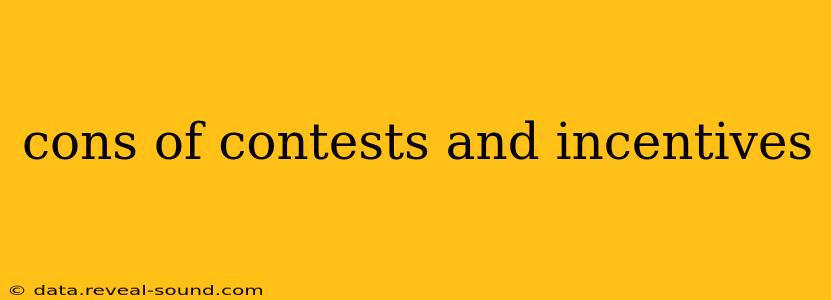Contests and incentives, while powerful tools for boosting engagement and driving sales, aren't without their drawbacks. Understanding these potential downsides is crucial for businesses to avoid costly mistakes and maintain a positive brand image. This article delves into the key disadvantages of using contests and incentives, offering insights to help you navigate the complexities of these promotional strategies.
Can Contests Damage Your Brand Reputation?
Yes, poorly planned contests or incentives can indeed damage your brand reputation. This can happen in several ways:
- Low-Quality Entries: If the prize isn't enticing enough or the participation requirements are too low, you might attract a flood of low-quality entries that reflect poorly on your brand. This is especially true for creative contests where the bar is set too low. A poorly executed contest can feel cheap and even exploitative of participant's time and effort.
- Negative Public Perception: Controversial contest rules, unfair judging, or even accusations of fraud can lead to negative press and damage your brand's trustworthiness. Transparency and fairness are paramount.
- Focus Shift from Core Values: A poorly designed contest can overshadow your brand's core message and values, diluting your brand identity and confusing your target audience. The focus shifts from what you stand for to the prize itself.
Are Incentives Always Effective? What are the Downsides?
While incentives can be highly effective, they also have significant limitations:
- Short-Term Gains, Long-Term Losses: Contests and incentives often yield short-term gains in sales or engagement but fail to foster genuine brand loyalty. Customers might participate solely for the reward, not because they truly value your product or service.
- High Costs and Low ROI: The cost of prizes, marketing, and administration can significantly outweigh the benefits, resulting in a low return on investment (ROI). Careful planning and budgeting are essential to ensure profitability.
- Increased Customer Expectations: Regularly using incentives can lead to increased customer expectations, making it difficult to maintain engagement without offering increasingly larger or more frequent rewards. This creates a cycle of escalating costs and diminishing returns.
- Ethical Concerns: Certain incentives, particularly those related to health or financial gains, can raise ethical concerns if not carefully considered. Transparency and responsible marketing are crucial.
What are the Potential Risks of Running a Contest?
Beyond reputational damage and financial losses, several other risks are associated with running contests:
- Legal Issues: Failing to comply with contest regulations, such as disclosure requirements or eligibility criteria, can lead to legal issues and hefty fines. Thorough legal review is essential.
- Security Risks: Online contests can be vulnerable to fraud, hacking, and other security breaches. Robust security measures are necessary to protect both the company and participants.
- Technical Glitches: Technical issues during the contest can frustrate participants and damage your brand's image. Thorough testing and contingency planning are crucial.
How Can I Minimize the Negative Effects of Contests and Incentives?
To mitigate the risks and maximize the benefits of contests and incentives, consider these strategies:
- Clearly Defined Goals and Objectives: Set clear, measurable goals before launching a contest or incentive program. What do you hope to achieve? How will you measure success?
- Targeted Audience: Tailor your contest or incentive to your target audience's interests and preferences. Generic offers rarely resonate as effectively as carefully crafted ones.
- Compelling Prizes: Offer prizes that are relevant, desirable, and aligned with your brand. Don't offer something cheap or irrelevant; it'll backfire.
- Transparent Rules and Regulations: Clearly communicate the contest rules, judging criteria, and eligibility requirements to avoid misunderstandings and accusations of unfairness.
- Strong Security Measures: Implement robust security measures to prevent fraud and protect user data.
- Post-Contest Analysis: Thoroughly analyze the results of your contest or incentive program to identify areas for improvement and optimize future campaigns.
By carefully considering the potential downsides and implementing effective mitigation strategies, businesses can harness the power of contests and incentives while minimizing the risks to their brand and bottom line. Remember that a well-planned and executed contest can be a valuable asset, but neglecting potential pitfalls can lead to significant setbacks.
